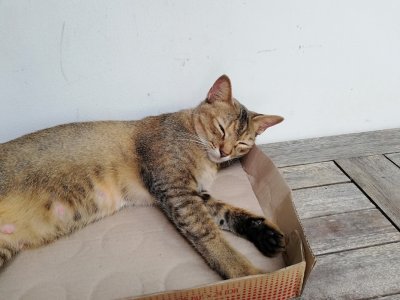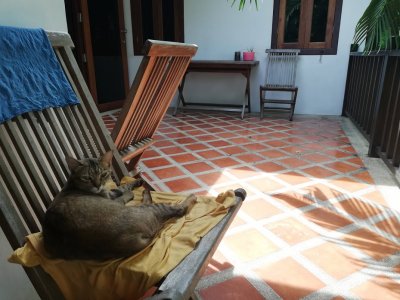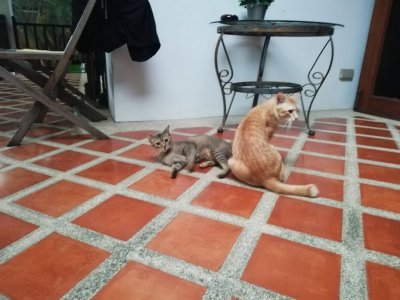Hello all,
My wife and I live a semi-nomadic lifestyle due to our tourism/diving related work, which leads us to move around every few months, rarely staying more than 6 months in one place. We’ve been in South-East Asia for the past few months, currently riding out the Covid-19 pandemic in Thailand.
We’re used to befriending local animals, usual dogs living on tropical islands or free roaming cats that abound in these parts, birds...
With lockdown, we ended up staying at home a lot, and interacting with the local stray/feral/semi-feral cats.
In our previous house for instance, 4 or 5 different cats would roam the area, getting food handouts from different houses including ours.
We befriended a mother, who would hang out and sleep outside our house everyday, knowing she could get a little cat food and water.
She was also hunting a lot would call her kittens out when she caught a bird or rat.
We moved out from this house a few months ago, to a new house further south with a slightly less urban setting, more of a closed off garden with a few houses. Here as well, there are many cats here roaming the area as well, and we befriended/fed three or four who often drop by, sleep on the terrace.
However, we’ve been experiencing something which is starting to worry us a little, what I can only describe as a overly affectionate (clingy?) and vocal young female cat…
We really don’t know what her story was, but she was very wild at first, hissing when would get close, while clearly appreciating food and attention.
I don’t think she was a former pet, judging by age, size and general behaviour.
I’d guess she’'s around a year old, hasn’t been neutered. She was very wild at first, actually more than the other cats in the area, meowing for food then always hissing when we would get close.
This lasted a while, a she would do call out insistently then hiss when we would feed her.
She was rubbing on legs with the others when being fed, and after a while we managed to pet her.
Now she seemingly enjoys it a lot and purrs, but still shows fear everyonce in while.
Tension, then relaxing and purring, often on the look-out, but now very relaxed, often rolling and showing her belly
She also generally doesn’really like it if we sit on the floor next to her outside for instance, more relaxed when we’re standing.
She always raises her hind legs when getting petted, but is not in heat, just a kind of reflex pose.
All cats around here scatter if your’re sweeping or even have a broom in your hand, implying that they’'ve probably been chased away in the past.
She also doesn't really play.
Because of these factors and her age, I doubt that she was once really a pet or housecat, but you never know...
I think the house we moved in was empty for at least 4 months, judging by the state it was in.
Maybe previous inhabitants fed the area’'s numerous strays like we did. There was a food dish outside, but it could have been for a dog as well (a lot of people, including all our neighbours, have dogs).
But this now resident cat also super vocal, meowing a lot, even when she has food. At first we wondered if there was something wrong with her, pain or distress, but it seems to be fine.
But she does seems to need attention more than food.
She recently started calling out to us from outside in the morning while we’re sleeping, really insistent, and she also has these phases during the day when she’s just calling us out, answering us when we’re talking inside (doors are always open in this tropical weather, but she’s kept out by fly-screens), hopping on the window sill, looking inside....
She kind of alternates between long sleeps on the terrace chairs and table and these vocal outbursts, with a real range of meows, which seem to stop only if someone comes to see her - we're refraining from doing that to avoid rewarding and reinforcing this slightly manic behaviour, only going to see her when she's quiet.
I’ve never seen this. It’s a little scary because she has really adopted us, staying outside our house all day, running over and meowing when we return from shopping, in the morning etc… And it’s clearly not just about the food, she basically has this habit of calling us out, stopping after a cuddle.
She’s also quite friendly with other neighbourhood cats who stop by, and eat not aggressive at all. On male is often there as well, they get along, she runs to him, purr, rub and call out to each other, and she'll eat if he's eating - overall much more vocal than cats usually are, which is a little strange (not mating or anything) - maybe it's a cultural thing?
We really don’t mind have her hang around all day (she sleeps on a table or chair most of the time) or meowing for food, but meowing for attention like this is a bit more than what we expected…
It’s a little overwhelming, especially since we’re not working at the moment and home everyday, and didn't intend to have a pet.
So we’re doing our best to ignore her when she’s calling out for attention, and give her attention when she’s quiet, to try to change this behaviour, but not sure what we can do about the meowing outside in the morning, outside our house. I think she starts at 6:30, and I’m afraid our dog-owning neighbours will start complaining,..
Unfortunately, as cute as she is, taking her in is not an option, as we work in tourism/diving, and rarely staying more than 6 months in the same place, and are in no material position to take care of a pet.
There's high chances we’ll end up in a remote part of Indonesia or in a resort island in the Maldives in the next 2 or 3 months, so traveling and living this kind of life with home and stability-loving animals such as domestic cats is not possible, not to mention quarantine/health issues.
We’'re not really worried about her welfare when she’'s gone (Burmese caretaker is feeding more than 10 cats... ), and in the stable, warm tropical weather we get in these parts, animals are quite happy ouside, with plenty of rats and birds to hunt, and frequent human hand-outs, Thai people do like cats a lot.
And she does hunt birds.
However, in the light of this experience, I’'m starting to feel it’s best to avoid feeding/interracting with cats altogether.
It's the first time we've had a cat get so affectionate/demanding and vocal, normally those we encouter continue to live their own lives, while enjoy food where they can get it.
I'm wondering if it's not really connected to the fact that we're always home at the moment, which increased her emotional dependency, and hearing us talk makes her want to let's say join-in?
Anyway, what would you say is going on here? Is there anything we can do to try to restore a little breathing room into this human-animal relation?
thanks
ben
My wife and I live a semi-nomadic lifestyle due to our tourism/diving related work, which leads us to move around every few months, rarely staying more than 6 months in one place. We’ve been in South-East Asia for the past few months, currently riding out the Covid-19 pandemic in Thailand.
We’re used to befriending local animals, usual dogs living on tropical islands or free roaming cats that abound in these parts, birds...
With lockdown, we ended up staying at home a lot, and interacting with the local stray/feral/semi-feral cats.
In our previous house for instance, 4 or 5 different cats would roam the area, getting food handouts from different houses including ours.
We befriended a mother, who would hang out and sleep outside our house everyday, knowing she could get a little cat food and water.
She was also hunting a lot would call her kittens out when she caught a bird or rat.
We moved out from this house a few months ago, to a new house further south with a slightly less urban setting, more of a closed off garden with a few houses. Here as well, there are many cats here roaming the area as well, and we befriended/fed three or four who often drop by, sleep on the terrace.
However, we’ve been experiencing something which is starting to worry us a little, what I can only describe as a overly affectionate (clingy?) and vocal young female cat…
We really don’t know what her story was, but she was very wild at first, hissing when would get close, while clearly appreciating food and attention.
I don’t think she was a former pet, judging by age, size and general behaviour.
I’d guess she’'s around a year old, hasn’t been neutered. She was very wild at first, actually more than the other cats in the area, meowing for food then always hissing when we would get close.
This lasted a while, a she would do call out insistently then hiss when we would feed her.
She was rubbing on legs with the others when being fed, and after a while we managed to pet her.
Now she seemingly enjoys it a lot and purrs, but still shows fear everyonce in while.
Tension, then relaxing and purring, often on the look-out, but now very relaxed, often rolling and showing her belly
She also generally doesn’really like it if we sit on the floor next to her outside for instance, more relaxed when we’re standing.
She always raises her hind legs when getting petted, but is not in heat, just a kind of reflex pose.
All cats around here scatter if your’re sweeping or even have a broom in your hand, implying that they’'ve probably been chased away in the past.
She also doesn't really play.
Because of these factors and her age, I doubt that she was once really a pet or housecat, but you never know...
I think the house we moved in was empty for at least 4 months, judging by the state it was in.
Maybe previous inhabitants fed the area’'s numerous strays like we did. There was a food dish outside, but it could have been for a dog as well (a lot of people, including all our neighbours, have dogs).
But this now resident cat also super vocal, meowing a lot, even when she has food. At first we wondered if there was something wrong with her, pain or distress, but it seems to be fine.
But she does seems to need attention more than food.
She recently started calling out to us from outside in the morning while we’re sleeping, really insistent, and she also has these phases during the day when she’s just calling us out, answering us when we’re talking inside (doors are always open in this tropical weather, but she’s kept out by fly-screens), hopping on the window sill, looking inside....
She kind of alternates between long sleeps on the terrace chairs and table and these vocal outbursts, with a real range of meows, which seem to stop only if someone comes to see her - we're refraining from doing that to avoid rewarding and reinforcing this slightly manic behaviour, only going to see her when she's quiet.
I’ve never seen this. It’s a little scary because she has really adopted us, staying outside our house all day, running over and meowing when we return from shopping, in the morning etc… And it’s clearly not just about the food, she basically has this habit of calling us out, stopping after a cuddle.
She’s also quite friendly with other neighbourhood cats who stop by, and eat not aggressive at all. On male is often there as well, they get along, she runs to him, purr, rub and call out to each other, and she'll eat if he's eating - overall much more vocal than cats usually are, which is a little strange (not mating or anything) - maybe it's a cultural thing?
We really don’t mind have her hang around all day (she sleeps on a table or chair most of the time) or meowing for food, but meowing for attention like this is a bit more than what we expected…
It’s a little overwhelming, especially since we’re not working at the moment and home everyday, and didn't intend to have a pet.
So we’re doing our best to ignore her when she’s calling out for attention, and give her attention when she’s quiet, to try to change this behaviour, but not sure what we can do about the meowing outside in the morning, outside our house. I think she starts at 6:30, and I’m afraid our dog-owning neighbours will start complaining,..
Unfortunately, as cute as she is, taking her in is not an option, as we work in tourism/diving, and rarely staying more than 6 months in the same place, and are in no material position to take care of a pet.
There's high chances we’ll end up in a remote part of Indonesia or in a resort island in the Maldives in the next 2 or 3 months, so traveling and living this kind of life with home and stability-loving animals such as domestic cats is not possible, not to mention quarantine/health issues.
We’'re not really worried about her welfare when she’'s gone (Burmese caretaker is feeding more than 10 cats... ), and in the stable, warm tropical weather we get in these parts, animals are quite happy ouside, with plenty of rats and birds to hunt, and frequent human hand-outs, Thai people do like cats a lot.
And she does hunt birds.
However, in the light of this experience, I’'m starting to feel it’s best to avoid feeding/interracting with cats altogether.
It's the first time we've had a cat get so affectionate/demanding and vocal, normally those we encouter continue to live their own lives, while enjoy food where they can get it.
I'm wondering if it's not really connected to the fact that we're always home at the moment, which increased her emotional dependency, and hearing us talk makes her want to let's say join-in?
Anyway, what would you say is going on here? Is there anything we can do to try to restore a little breathing room into this human-animal relation?
thanks
ben





